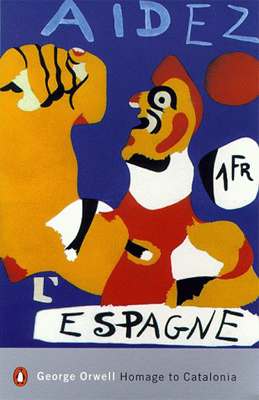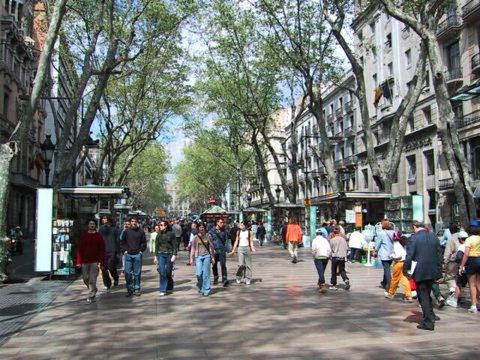
Title: Homage to Catalonia
Author: George Orwell
Genre: Fiction, Historical
ISBN: 0141183055
# of Pages: 248
Publisher: Penguin Books;1938
Began Reading: January 30th, 2006
Finished Reading: Feb. 4th, 2006
In Barcelona, my days fell into a pattern. I would wake up at 6am and go to Starbucks for 6:45. There after being online for 2 hours, I would return home and change. Sometimes Painter J, the person I was staying with, would be home and we may chit chat before I left for either a guided tour or sightseeing. That lasted till 2pm for which I would return to the studio and meet J again for lunch... almost everyday for over 3 weeks. One of these same mornings, as I was returning to the studio in hopes of eating rabbit for lunch, I realized that I was early and decided to puruse the bookstore shelves. Not expecting to find anything of interest - it is Barcelona after all- the covers of the books and the familiarity of a 'face' well loved was enough. Then an odd cover, what looked to be a rooster, caught my eye. I unconsciously went to pick it up. Seeing the title and the author and the language, the purchase was a done deal. That's how and where I ended up reading Homage to Catalonia.
The Incident: Our main character, a British gentleman, finds himself in Barcelona with his wife at the Eve of the Spanish Civil War - the fight between Franco and the Republicans/Loyalists. Our narrator, overcome with the sensation of having entered into an' era of equality & freedom' (page 4), joins forces with the latter group in the fight against monarchy and totalitarian rule. What follows is an account of war - unorganized, cold, smelly and quit boring to those who fight it. As our English eye-witness tells it, there came a point where there was uncertainty about who was what and where. Though he, till the very end, defends the Loyalists and their cause, he acknowledges the impossibility of complete horizontal rule. "If you wanted to slap the general commanding the division on the back and ask him for a cigarette, you could do so, and no one thought it curious. In theory at any rate each militia was a democracy and not a hierarchy." (Page 26) His peers are his superiors and vice versa. There is no authority nor organization - simply put they fight - or try to - a common enemy. With that, comes the insight Orwell brings to the Catalonia way of life. When asking a Spaniard for a cigarette they give the entire pack, he recounts.
Comments: It was a good read to be sure though the language was somewhat dense. This is not so fictitious as Animal Farm or 1984. The account is very much like a memoir thus it took some adapting to. Never thought that a gendre had such an effect on my frame of mind while reading but it did. Of course, the experience and knowledge gained from the text enriched my trip and experience there. Top that off with sharing the text with J as he related his vivid memories of the Civil War in return.

Worst Part: considering the fact that there was such little excitment on the field, that description in the 'novel' could have been cut down a little. Though it may have been intentional to drag it out somewhat, time is of essence People! But for Orwell and the men in the trenches, time was their worst enemy.
Recommend to: A great way of introducing a subject that is otherwise left unsaid in history class. Franco's war and rule is not considered to be a dictator because of the NUMBERS - numbers of deaths, number of soldiers, number of those involved. Though he killed as many for simply being liberal teachers - including J's own 1st grade teacher - he didn't kill enough for that 'honour'.
Cool Fact: Though considered to be a work of fiction by Orwell, the gentleman in question did in fact live in Barcelona at the time of the Civil War and did fight for the Loyalists. This is more of an eyewitness account then one would at first believe it to be.
Orwell's real name is Eric Blair. He wrote this as he was recooperating from his wound.
Tuesday, December 12, 2006
Olé-lé, Ola-la, Olé-lé, Ola-la
Posted by
nessie
at
10:08 a.m.
![]()
Labels: Fiction, History | Hotlinks: DiggIt! Del.icio.us
Subscribe to:
Post Comments (Atom)



3 Comments:
This was a book I'd never heard of and by Orwell - What a surprise. What an experience to read it in Barcelona and to hear of J's memories.
Nessie, about the challenge - just write your reviews/thoughts about the books you read as you finish them. At the end of Feb. you could do a 'sum up' post listing the books you did get read for the challenge. Does that sound clear as mud?
I, I captain. Will do promise.
My intention is to try and read 50% the first days of January. What a keener I am!
Nessie, I feel like such a fool. I have been making so many mistakes lately. I thought it was you that asked what to do once you've read a book. No, it was someone else. In my defense, their blog name starts with an 'N' too. When I realized my mistake, I thought, "Nessie, must think me a little boss or something, leaving that comment just out of the blue." So I chuckled when I saw your "I, I captain." To make this l-o-n-g apology short - Please, disregard prior comment. Geesh!
Post a Comment